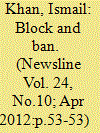|
|
|
Sort Order |
|
|
|
Items / Page
|
|
|
|
|
|
|
| Srl | Item |
| 1 |
ID:
089668


|
|
|
|
|
| Publication |
2009.
|
| Summary/Abstract |
The saga of the "Green Dam," Beijing's most recent censorship initiative, has become a Rorschach test for how one views the development of the Chinese Internet. Facing mounting opposition, the government announced it was temporarily shelving a controversial requirement to install the problem-laden filtering program on every personal computer sold in China just hours before the policy was to go into effect on July 1. Some see this as a victory for freedom of expression; others as a temporary reprieve.
|
|
|
|
|
|
|
|
|
|
|
|
|
|
|
|
| 2 |
ID:
113070


|
|
|
| 3 |
ID:
142673


|
|
|
|
|
| Summary/Abstract |
China’s Internet development raises questions on the interplay of user autonomy and Internet governance in the larger Chinese-language online cultural sphere. To what extent has user autonomy been established to conduct information gatekeeping collaboratively online? To examine how the power of Chinese-language Internet users has been harnessed in relation to the filtering and censorship regime, the article applies the concept of “network gatekeeping” to analyse two major user-generated websites, Chinese Wikipedia and Baidu Baike, as different examples of collaborative filtering projects. Effectively they share “word-of-mouth” recommendations on encyclopaedic knowledge and information by user-contributors to edit content from different parts of the world. Two salient network gatekeeping mechanisms have emerged: the censorship mechanisms in Baidu Baike and internationalisation/localisation mechanisms in Chinese Wikipedia. The findings show a contrast between the two interaction patterns, indicating mainland-centric versus transnational Chinese gatekeeping processes employing different kinds of collaborative filtering and different levels of user autonomy.
|
|
|
|
|
|
|
|
|
|
|
|
|
|
|
|
| 4 |
ID:
123785


|
|
|
|
|
| Publication |
2013.
|
| Summary/Abstract |
Internet freedom is rapidly becoming understood as a normative framework for how the Internet should function and be used globally. Recently declared a human right by the United Nations, it also forms a central pillar of the USA's 21st Century Statecraft foreign policy doctrine. This article argues that although there is a clear human rights agenda present in this policy, there is also a power element which is much less discussed or acknowledged in the vast literature on Internet freedom. Through an exploration of both a short history and some important lessons learned about Internet freedom, this article demonstrates how the US Department of State has adapted to the information age in such a way as to harness individual agency (reconceptualised in policy terms as 'civilian power') for the promotion of state power. Although this is by no means as stable or reliable as some more conventional mechanisms, it is an expression of power that meets with few challenges to its legitimacy.
|
|
|
|
|
|
|
|
|
|
|
|
|
|
|
|
| 5 |
ID:
090653


|
|
|
|
|
| Publication |
2009.
|
| Summary/Abstract |
In today's globalized political economy, diplomacy between nation-states (state-state diplomacy) now exists alongside state-firm diplomacy, the negotiations between multinational corporations (MNCs) and the countries in which they do business. While the state must be committed to the interests of its MNCs in the interest of domestic state-firm diplomacy (maintaining a supportive business environment), it still has recourse to address failures in corporate diplomacy and to maintain the appearance of dominance on the world stage. This paper examined these strategies through a critical analysis of prepared testimony at the February 2006 congressional hearing regarding the controversial actions of four U.S. IT MNCs (Google, Microsoft, Yahoo, and Cisco) operating in China. I conclude that when the government is constrained from using its hard power on its MNCs, soft power becomes its most effective tool. Image, suggestion, and appearance-soft power-can be considered more important than legislation itself-hard power-and perhaps even the currency of current state-firm relations.
|
|
|
|
|
|
|
|
|
|
|
|
|
|
|
|
| 6 |
ID:
176044


|
|
|
|
|
| Summary/Abstract |
The internet provides a powerful tool to terror organizations, enhancing their public messaging, recruitment ability, and internal communication. In turn, governments have increasingly moved to disrupt terror organizations’ internet communications, and even democracies now routinely work to censor terrorist propaganda, and related political messaging, in the name of national security. We argue that democratic states respond to terror attacks by increasing internet censorship and broadening their capacity to limit the digital dissemination of information. This article builds on previous work suggesting this relationship, substantially improving measurement and estimation strategy. We use latent variable modeling techniques to create a new measure of internet censorship, cross nationally and over time, from internet firm transparency reports, and compare this measure to an expert-survey based indicator. Leveraging both measures, we use a variety of panel specifications to establish that, in democracies, increases in terror predict surges in digital censorship. Finally, we examine the posited relationship using synthetic control methods in a liberal democracy that experienced a large shock in terror deaths, France, showing that digital censorship ramped up after several large terrorist attacks.
|
|
|
|
|
|
|
|
|
|
|
|
|
|
|
|
|
|
|
|
|